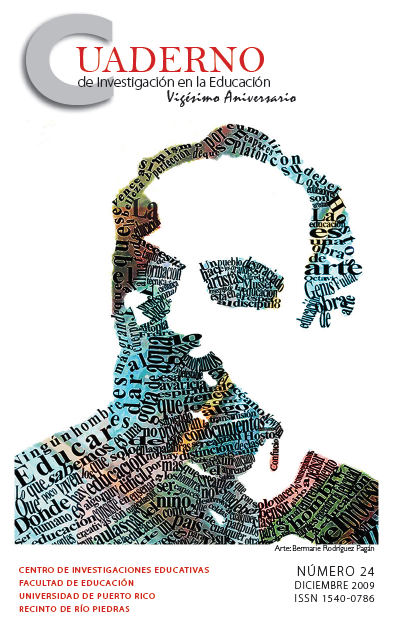Abstract
The main objective of this evaluation was to investigate the effectiveness of learning strategies used in the Teaching Elderly Adults to Use Computers and Internet Project, developed by the Puerto Rico Assistive Technology Program (PRATP) under the FILIUS Institute, University of Puerto Rico. Among the strategies, it highlights the use of assistive technology (AT) to increase the functional capabilities of participants and to facilitate the handling of computers. Another strategy was the inclusion of teaching methods for elderly. This descriptive research involved interviews with participants and facilitators of the project. A participatory approach from an ex post facto evaluation was used. It included a qualitative and frequency analysis of some replies given by the interviewed students. The evaluation concluded that both strategies were effective on teaching basic computer and Internet skills to elderly. It also emphasized that participants and facilitators were very satisfied with the training results.
How to cite:
González-Hilario, B. (2009). Evaluación de los retos y beneficios del uso de computadoras adaptadas entre la población de edad avanzada. Cuaderno de Investigación en la Educación, 24, 149-164. Retrieved from https://revistas.upr.edu/index.php/educacion/article/view/13553
References
Elliot, R. (1991). Assistive Technology for the Frail Elderly: An Introduction and Overview. HHS's Office of Family, Community and Long-Term Care Policy (now DALTCP) and the University of Pennsylvania. Recuperado el 5 de diciembre de 2008, de http://aspe.hhs.gov/daltcp/reports/asttech.htm
Flood, C. (2007).El adulto como sujeto de aprendizaje en entornos virtuales. Ponencia presentada en el congreso EDUTEC 2007: Inclusión digital en la educación superior, Buenos Aires, Argentina. Recuperado el 8 de enero de 2009, de http://www.utn.edu.ar/aprobedutec07/docs/179.doc
García, N. (2007). La educación con personas mayores en una sociedad que envejece. Ensayo. Horizontes Educacionales, 12(2), 51-62. Recuperado el 8 de enero de 2009, de http://helios.dci.ubiobio.cl/revistahorizontes/Revista
Limón, M., & Crespo, J. (2001). Grupos de debate para mayores: guía práctica para disfrutar con plenitud la jubilación y la vejez. España: Editorial Narcea, S.A. Recuperado el 8 de enero de 2009, de http://books.google.com.pr
Mañós, Q. (1998). Animación estimulativa para personas mayores discapacitadas. España: Editorial Narcea. Recuperado el 8 de enero de 2009, de http://books.google.com.pr
Monchietti, A., Krzemien, D., & Lombardo, E. (2004). Procesos psicológicos del aprendizaje y configuraciones pedagógicas en la educación gerontológica. Recuperado el 8 de enero de 2008, de http://www.psiquiatria.com/articulos/psicogeriatria/15262
Shapiro, P. (1995). Computers Use and the Elderly. Recuperado el 20 de agosto de 2008, de http://www.his.com/~pshapiro/computers.and.elderly.html.
Saliba D., Orlando M., Wenger N.S., Hays R.D., & Rubenstein L.Z. (2000). Identifying a Short Functional Disability Screen for Older Persons. Journal of Gerontology: Medical Sciences, 55A(12), 750-756.
Saunders, E. (2004). Maximizing Computer Use Among the Elderly in Rural Senior Centers. Educational Gerontology, 30(7), 573–585.
The contents published in the Puerto Rico Journal of Education is freely distributed under open access practices, in accordance with the Creative Commons license, Attribution-NonCommercial 4.0 International (CC BY-NC 4.0). Through these principles, the journal and its authors allow readers to access, reproduce and share articles in full text. Users should give credit to authors in a reasonable way without suggesting they have their support. Under no circumstances, readers may make use of the contents for commercial purposes. The authors retain copyright on their works.

